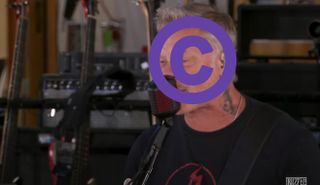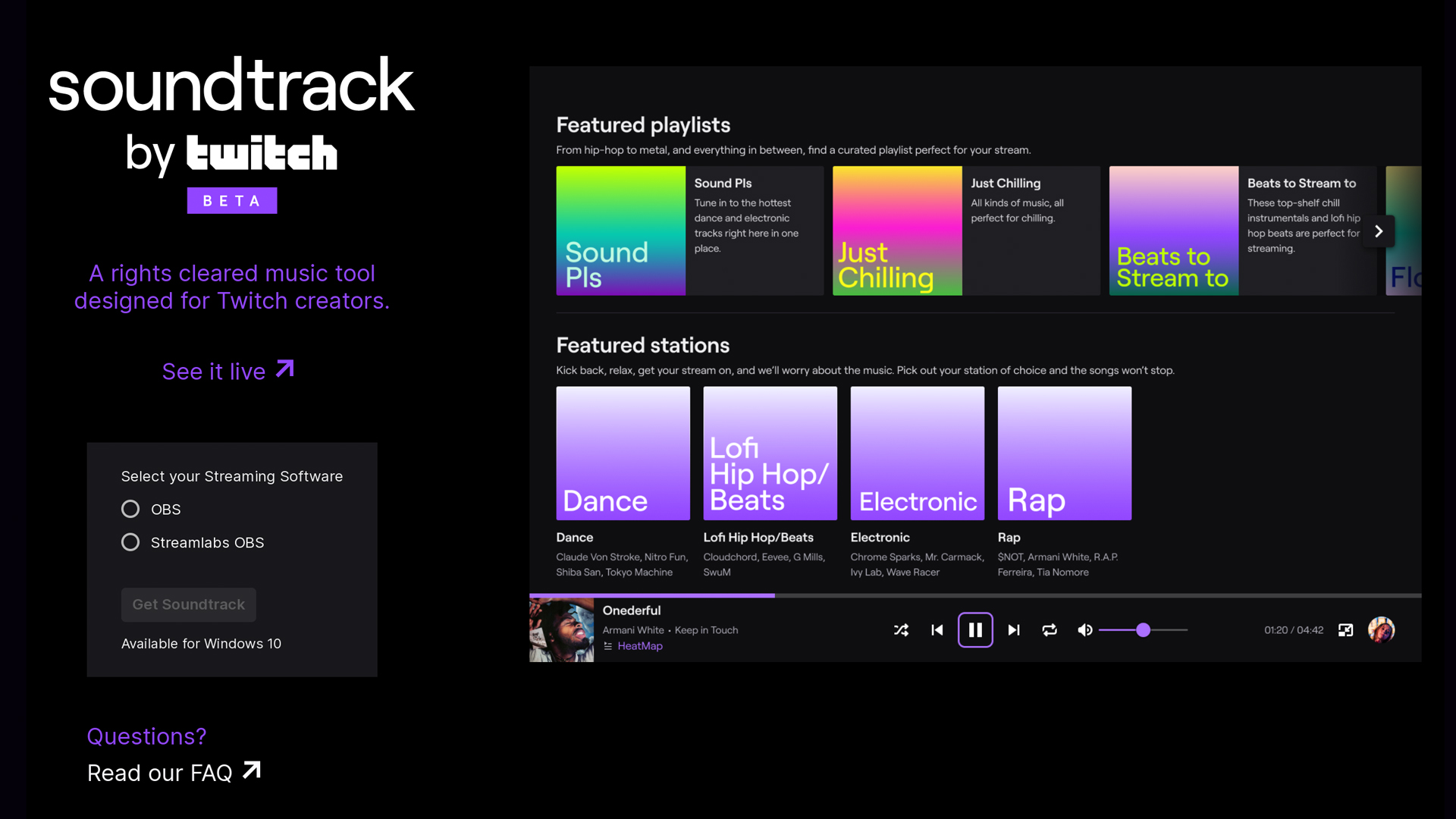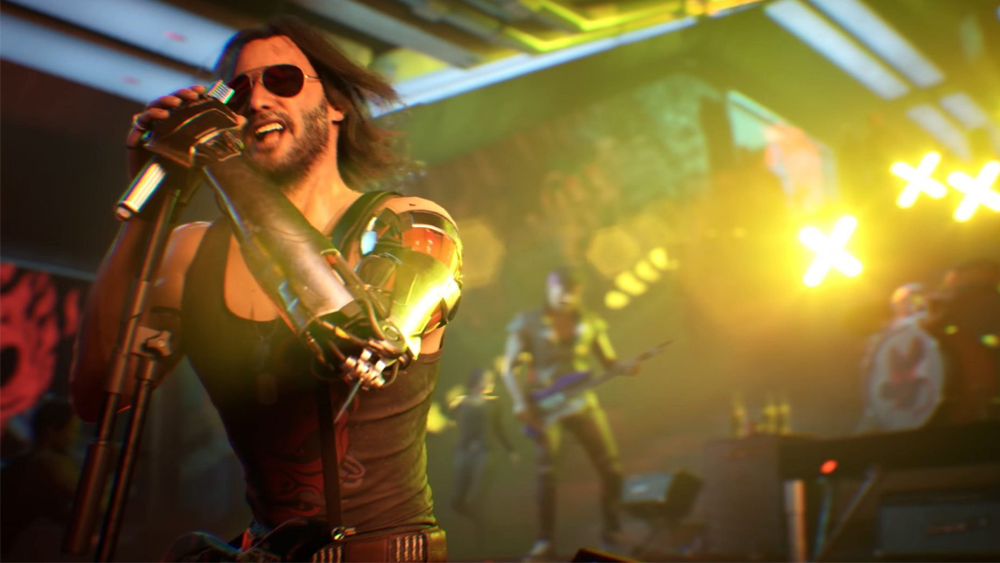How does Twitch escape its new DMCA hell? | PC Gamer - crisprombass
How does Twitch escape its spic-and-span DMCA hell?

Metallica never scored a Legend of Zelda game, simply it sounded like information technology, for a minute, when Tweet replaced a past Metallica unrecorded performance with some royalty free musical instrument digital interface music during BlizzCon. The goofy, plinky-plank score that replaced Metallica along February 20th utterly encapsulated what an awkward spot Twitch is in right now with music copyright: the biggest streaming platform in the world had to censor its ain broadcast surgery risk upsetting an already angry music industry.
Last year, the music industry attacked Twitch in a letter claiming information technology did "nothing in response to the thousands of notices of music infringement" that it had accepted over the years. That wasn't exactly true—Twitch replied that it does pass along what it considers "valid" DMCA takedown requests for copyrighted material—but the music industry clear wasn't satisfied.
"Flip continues to turn a blind eye to the same users repeatedly violating the law while pocketing the proceeds of solid unlicensed uses of prerecorded music," said the chairman of the RIAA. "And Twitch's claim that information technology responds to takedown requests it considers 'valid' fails to demo good faith with music creators."
So Twitch reacted—dramatically. In Oct, Twitch forced streamers to delete thousands of old clips that contained licensed music in just a few years, with no good tools at their disposal to learn which files were actually difficult.
The moment of crisis has passed, merely Twitch yet has to deal with a whole whole lot of problems:
- Playacting music from Spotify being wont for streamers after old age with no issues
- The music industriousness is disturb with copyrighted music in livestreams and VODs, but Twitch's existing solutions are all for the latter
- The music industry insists Vellication needs to pay for synchronization and automatic euphony licenses for its Soundtrack tool
- Giving streamers the tools to palm DMCA takedowns without nuking their whole archives
Soh how can Squeeze resoluteness its current stand-sour with the music industry? Is that Metallica concert just a preview of what enforcement bequeath look like in few years, with automated tools detecting and silencing proprietary material live, in real time?
"[That's what] I would expect," says Kellen Voyer, a lawyer who specializes in IP and engineering science law. "YouTube was an early infringer and is now getting competent (still has room for improvement) in assisting rights holders in protective right of first publication and I expect we'll see an improvement happening the moving side in the next a couple of years. With all new technology there's a period of exemption, then a teething period of time, then both form of equilibrium between the technology and rights holders. Then some other technology emerges and IT starts all once again."
Squeeze today is firmly into its teething period. In November, Twitch wrote to streamers owning capable the mess of DMCA takedowns that flooded the platform unlikely year, saying that "things dismiss—and should—constitute major for creators" and egg laying out plans for upcoming tools that will make it easier for streamers to cope copyright on their channels.
What it hasn't said such about is what Twitch, every bit a platform, could potentially do to prevent those DMCA takedowns altogether. On that point's one really patent solution here for Twitch to conciliate the music industry: Pay.

Answer: More money, fewer problems
Twitch already pays the music industry licensing fees for live performances, so if you need to do your possess cover of a Metallica Song, you're in the enlighten. But when it comes to playing prerecorded music, which is far more common, streamers are entering a DMCA minefield. Last year Twitch launched a tool called Soundtrack with a selection of licensed music, automatically played over a distinct audio channel so it's easy to play them hold ou, simply keep them outgoing of VODs. That's because the rights for charged music and recorded medicine are different. It seems care an ideal solution—simply the music industry says it doesn't live far enough.
I carry the RIAA and other groups are keeping out for a deal being struck with Pinch
Kellen Voyer
The industry's October letter insisted that for Soundtrack, Twitch necessarily to invite synch rights, which stimulate complicated and confusing in a hurry. The gist is that synch rights enforce to the pairing of music with imagery. Nip claims Soundtrack is "amply licensed," but its argument is based on an rendering of the law that would mean value synch doesn't apply to streams.
"If the experience stream is truly 'live' (i.e., in real time and not recorded), many rights users take the position that the musical composition does not need to be cleared, as it is not 'stationary' with the visual images and therefore does non implicate a copyright owner's exclusive rights," explains the Reed Smith guide to livestreaming.
That's on the button Squeeze's position. The music industry, unsurprisingly, doesn't go through it that way. "We are mixed-up by Pinch's apparent stance that neither synch nor mechanical licenses are necessary for its Soundtrack joyride," a letter from the RIAA and other music manufacture bodies explicit back in October. (A mechanical licence covers the right to multiply and distribute a musical composition).
And so if the music industry thinks Twitch is skipping out on necessary licenses, wherefore the unfavourable letter and not a lawsuit?
"I expect the RIAA and other groups are property come out of the closet for a deal beingness struck with Twitch," says Voyer. "They've had a long-wool history of protracted, public battles over new technologies that have ne'er concluded incisively as they want and often been ill for PR. The medicine piracy lawsuits against individuals (and too Napster) were for sure painful for PR and I wonder if they'Ra focused on the easier, larger target of Twinge/Amazon with this in mind. Further, on that point's a lucrative relationship that could result should the parties ink a deal so continuing to push outside of court is a way to engage this option."

A more robust licensing arrangement isn't an off-the-wall idea. In September, Facebook Gaming signed a deal with better put down companies to allow for authorized music in both livestreams and VODs. There are still limits to what songs can be played, of course, but it's a "stroke money at the problem" resolution that takes some of the risk away from creators. Information technology's as wel a smart move for the less favourite streaming platform that could lure in few particularly frustrated streamers.
Twitch's owner Virago could certainly yield to pay millions of dollars more to the music industry if it chose to, and it seems care a no-brainer to tie together Twitch and Amazon Music Unlimited in some way. Twitch Soundtrack included about 1 million songs at launch, but that's a fraction of the 70 zillion Beaver State so on Spotify. Twitch doesn't have deals with some of the major euphony companies that Facebook does, like Warner, Universal, and Sony. If big-name partnerships and a sweetened licensing deal aren't in Twitch's future, it seems likely some kinda automated copyright arrangement for livestreams, and not just VODs, bequeath be.
Solvent: Automate information technology
In the future days of YouTube, information technology was anything goes and right of first publication beryllium damned. That didn't last long, and in 2007 Google introduced Content ID, designed to scan videos and equivalence them against a database of copyrighted material. The automation means copyright holders don't have to rely entirely on DMCA takedowns, though course it comes with plenty of problems for YouTubers, too. Information technology's a sledge, not a scalpel.
Today, Content ID can straight-grained supervise livestreams and shut them down when they contain proprietary content, which is where YouTube differs from Twitch most dramatically. Twitch uses a service called Audible Magic to detect proprietary material and mute IT in VODs and clips (though gormandize inevitably slips through, which is why streamers hush father frequent DMCA takedown notices). Audible Magic does not work instantly, however.
On YouTube, when ContentID flags something as copyrighted in a livestream, the resulting bans can feel punitive to streamers—peculiarly if the algorithm is wrong, which happens often. Content ID is particularly skilful at flagging music, and the Electronic Frontier Foundation argues that the system dampens creativity on YouTube, bulldozing situations that should exist considered fair use.
"A whole writing style of art is covered far to a lesser degree others simply because Content ID makes more music matches than audiovisual ones," aforesaid the EFF in a 2020 article. "While sightly use would protect music reviews equally transformative, Content ID makes doing them on YouTube nigh impossible. Content ID only determines whether a few seconds of a video matches a few seconds of something in its database. And then while fair-minded use has no bright-line rule about how much a creator fanny or cannot practice, Content ID does. And IT's honorable a a few seconds."

If Twitch is planning new licensing deals or a content matching system that works live, information technology's not talking about those plans publically
Fair use isn't the major issuance happening Twitch, where streamers often play music in the background sooner than for purposes of literary criticism or education. Just it could stillness be relevant to the music inside games. Cyberpunk 2077 launched with a streamer modal value that was supposed to handicap proprietary euphony, making it invulnerable for Twitch. But some moments in the halting triggered DMCA strikes, anyway.
In court, streamers could argue that their comment over a biz and its music is a transformative cultivate, invulnerable by fair purpose. Most game publishers don't mind letting streamers talk over their games, straight when they don't add unequivocal permission to a halt's EULA. But licenced music in those games is another account. The music industry wants its royalties. Even if a streamer could win a evenhandedly use contend in court over a pop call in Cyberpunk, they'd still receive to mete out with the DMCA takedown prototypic to comply with Twitch's rules.
Voyer thinks it's possible Jerk ends up with a system something like YouTube's Contented ID, which already whole shebang with live broadcasts. Right now, Flip is focus along tools for streamers, alike the power to more easily blue-pencil batches of VODs and better DMCA notifications. Promote away, information technology's planning changes to its Clips database and dashboard to pull round easier to pinpoint clips that receive copyright strikes.
If Twitch is planning new licensing deals or a message matching system that works live, it's not talking about those plans publicly. A Nip representative did not respond to questions for this article.
"I expect virtually streamers want to use euphony without having to worry about licenses, that's their best internet live," says Voyer. "Conversely, the artists want exposure just also compensation for the use of their works, that's their best net get."
A solution ilk Subject matter I.D. for live streams would in all probability mollify the music industry—and specifically address its claim that "Squeeze continues to grow a unperceiving center to the same users repeatedly violating the law"—only would besides likely come with the same baggage the Electronic Frontier Creation set out. If Voyer's right, copyright issues will proceed to build on Twitch until something breaks: "You give the axe't propitiate some sides 100 percent, but I find that a new normal will appear later this current period of tension (which I bear will solitary increase before it gets best)."
Source: https://www.pcgamer.com/how-does-twitch-escape-its-new-dmca-hell/
Posted by: crisprombass.blogspot.com



0 Response to "How does Twitch escape its new DMCA hell? | PC Gamer - crisprombass"
Post a Comment